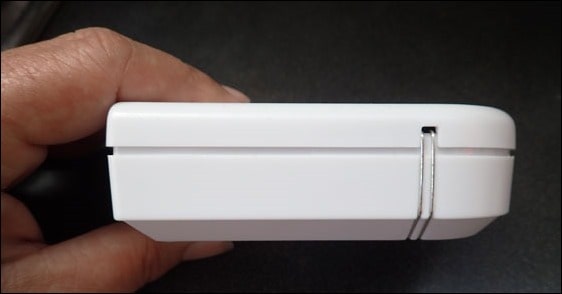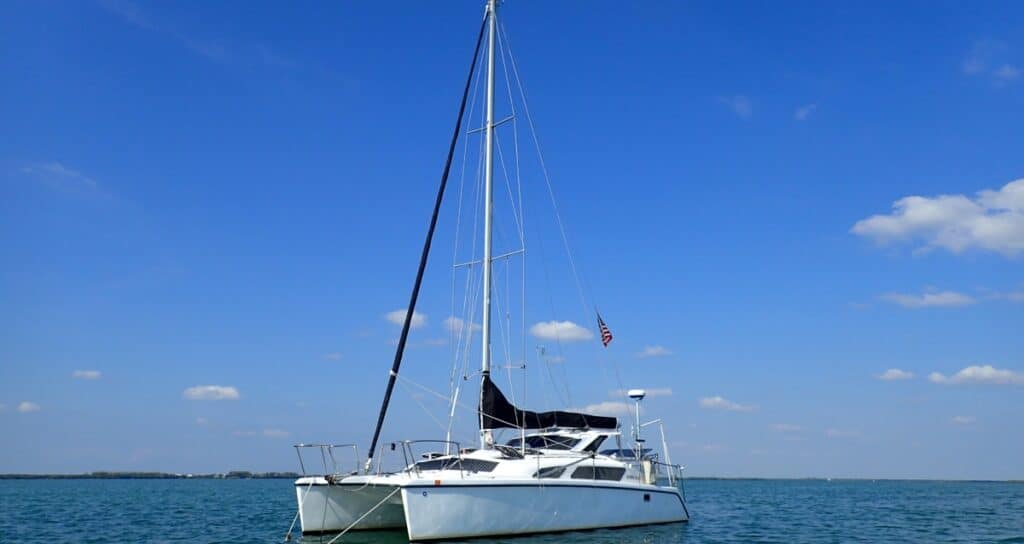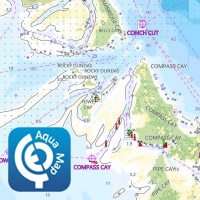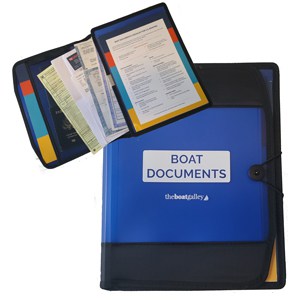A bilge alarm can save your boat. The faster you know water is coming into your boat, the faster you can act to save it.
One Bad Day
A while back, we got the horrible news that another Gemini took on water and sank underway to the Bahamas. Their buddy boat rescued the two people aboard with no injuries. But they lost their boat.
The owner publicly said that they discovered two inches of water over the floorboards in one hull around midnight. They were unable to find where the water was coming from. And within twenty minutes, they had to abandon the boat as it was about to capsize due to all the water in one hull.
Early Warning System
That got Dave and me thinking. Barefoot Gal did not have any sort of “early warning system” of water intrusion. Our previous boat, a Tayana 37 with deep bilges, had a very loud alarm on the primary bilge pump. If the pump ran, you knew it. And you could/would investigate.
Twice the sound alerted us to a problem. Once when the fresh water tank developed a leak. And the second alert sounded when someone installed the stuffing box upside down after work.
We both think that in order to have any chance of saving the boat in the event of a thru-hull failure or any other water intrusion, you have to know about it as soon as possible. (You also have to have the tools and a plan to stop the leak.) Time to set up a bilge alarm.
Leak Detectors
So I started looking at bilge alarms from various marine sources. I discovered that they tended to be expensive, hard-wired (hence, time-consuming to install) and most were designed for a light and alarm at the helm. Nothing wrong with them, but just seemed like overkill for a boat like ours. We don’t believe in “cheaping out” when it comes to safety equipment, but we thought that something simpler would actually be better.
Continuing to search, I was able to find a better solution for our needs: a home “leak detector.” A leak detector sounds an alarm (similar to a smoke detector) when it detects water. Homeowners typically use them near hot water heaters, washing machines, dishwashers, under sinks and toilets and near sumps. Luckily, one listed “boat bilges” as a possible use and Google picked up on it! (Disclaimer: while we thought these were right for us, you have to decide if they’re right for you.)

You place the unit on its back where you want to detect water. If water contacts both of those sensor wires, the alarm will sound.
They’re pretty small (a little larger than a deck of cards) and most run off a 9-volt battery. No installation, either – just pop in the battery, test it and place it where you want it.
Bilge Alarm Options
Several different companies make leak detectors and each has at least a couple models. After looking at many product listings and reviews on Amazon, I started picking up on some differences:
- Some are single-use and come with the battery preinstalled. They’re slightly cheaper but you can’t test them. And if they get wet once (say you leave a hatch open, it rains and water gets in the bilge) you have to replace them.
- Some do not float – if there is a lot of water, they’ll beep maybe once or twice, then silently die.
- Some have batteries that you cannot replace.
- A few you can only turn off by removing the battery. Just drying the contacts won’t stop the alarm.
- Most but not all have a low battery alert – generally a chirp similar to a smoke detector.
- Some have a lot of reviews saying that they’re not all that loud.
All will detect water somewhere in the 1/32” to 1/16” deep range. That’s actually a little oversensitive for us, as even a few drops of water from changing the speed log to the dummy plug when at anchor or a tiny leak in a hatch would set it off. But you can set up the gizmo it’s not quite in the lowest point of the bilge. This is what we did. It takes a couple gallons of water to trigger the alarm. Or you could glue a small strip of wood to one end of the bottom so that it would take more than just a few drops of water to sound the alarm (we don’t want a lot of nuisance alarms).
Our Choice
We chose the Zircon Leak Alert Electronic Water Detectors. They float, have a low battery alert, are small and are loud. From our test, I’d say they’re on a par with most smoke detectors which is plenty loud to wake us up or be heard anywhere on the boat). You can turn them off by drying the contacts. And you can use them again once they have gone off once.
Dave and I got one for each hull/bilge. Depending on your boat and bilge configuration, you might want additional water detectors near a fresh water tank or near your holding tank to tell you of problems in those areas too. They are relatively inexpensive so are a cost-effective early warning system.
We got the two-pack without batteries and bought four lithium 9v batteries (two to install immediately; two as spares):
- Zircon Leak Alert Electronic Water Detectors (some packages come with batteries, but don’t forget the spares)
- 9V Lithium Battery
Lithium batteries have by far the longest life in devices such as this and are worth the extra expense.
UPDATE: We recently bought a different model. A reader recommended the Glentronics Water Alarm. You can place the sensor 6 feet from the electronic alarm, which we mounted considerably higher than the sensor. This way, we are sure to hear the alarm before it becomes flooded.
Reader Suggestion for a Bilge Alarm
EXTRA: Reader Chris Munson sent me an email. He told me how his boat had been saved once. Another time he headed off quite a bit of water damage. He gave me permission to share it here:
“I’m SO glad you posted the article about bilge detectors! I have three $10 water detector alarms on my 32′ sloop; these are hardware store type alarms for home hot water heaters, dish washers, etc. They look like smoke detectors, with a sensor strip on a 36” wire. Nowhere does the word ‘Marine’ appear on the packaging. One sensor is at the ‘trigger’ water level at my main bilge pump. Should the auto-pump run, the alarm goes off. This alerted the marina staff the night my hot water heater sprang a leak and filled the bilge, syphoning the water tank as well. The other 2 are in my very isolated and sound-proof engine box. Last summer one went off while under power. Sure enough, an engine water hose had popped off, and there was 6 inches of rising hot engine raw water in the compartment. Without the alarm I would not have known the situation until the engine flooded and died. The alarm sound is like that of a smoke detector. The sensors are 2 metal studs on a plastic strip that is velcroed in place. I replace the 9 volt batteries every spring. $10 dollars each at Home Depot (see them here), usually stocked near the hot water heaters. Yes, I have 2 in my house also. They last years.”
Related Posts

Carolyn Shearlock has lived aboard full-time for 17 years, splitting her time between a Tayana 37 monohull and a Gemini 105 catamaran. She’s cruised over 14,000 miles, from Pacific Mexico and Central America to Florida and the Bahamas, gaining firsthand experience with the joys and challenges of life on the water.
Through The Boat Galley, Carolyn has helped thousands of people explore, prepare for, and enjoy life afloat. She shares her expertise as an instructor at Cruisers University, in leading boating publications, and through her bestselling book, The Boat Galley Cookbook. She is passionate about helping others embark on their liveaboard journey—making life on the water simpler, safer, and more enjoyable.
Here’s your “Quick Start” to everything you need to know when living on a boat:











The Boat Galley says
We did on our previous boat.
Helen Bell says
Its a great idea
Ryan Easter says
What did you install?
Marco Ghislanzoni says
We installed a Bilge Alert system by Johnson Pump. Given the fact we have a very deep bilge, I very much like the idea that the sensor is fully sealed and doesn’t have any moving part in it (no need to go head first in the bilge to check it or do maintenance).
The Boat Galley says
Marco Ghislanzoni — our bilge is very, very shallow — about 6 inches (15cm). Very easy to take it out and test. Our boat is a catamaran; different things make sense for different people.
The Boat Galley says
Yep. And lots of different features. To me, one of the biggest is how loud it is and whether it will float. And to me there’s no point in getting one of the single-use ones since you can’t test it.
Marco Ghislanzoni says
The Boat Galley I totally appreciate that in your case it would be easier to reach and test them from time to time. On the other hand I still wonder if a sensor made for home use (where typically the noise is limited, unless you have kids around of course…) and sitting forward in one of the hulls would be loud enough the be heard while, for example, you are steaming at full throttle and are maybe sitting on the flybridge.
If it is just for when you are at the anchor somewhere, then it could definitely do the job.
The Boat Galley says
Marco Ghislanzoni If you have a larger boat or a flybrige, this is probably not for you and you might want an alarm that would repeat at the helm. But we are a small catamaran. The alarms are no more than 10 feet from the helm. We tested and they are VERY audible over the engine — louder than the oil or temp alarms. They work for us, and could work for other smaller boats. The ease of installation means that people will install them — and that is better than not getting around to installing something else. Again, different boats need different solutions.
Carolyn Shearlock says
Ours doesn’t move much (we’re on a catamaran) but you could use a loop of tape or a bit of Velcro if need be.
Stephanie M says
Thanks! I don’t know what I’d do without your blog.
The Boat Galley says
Good to hear (bad pun there, but I meant I’m glad you had one and it sounded when needed)!
Carolyn Shearlock says
Near the centerboard drains on the outside of each hull (we had to install them, too).